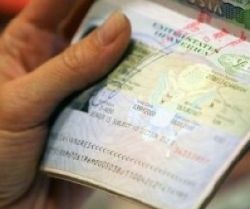
TBILISI, DFWatch–Georgia is on top of a list of former Soviet countries from where the highest number of people get their visa application rejected by the EU.
For each country in EU’s Eastern Partnership plus Russia, the Schengen visa rejection rate in 2013 was: Georgia 12 percent, Armenia 11 percent, Moldova 4.8 percent, Azerbaijan 4.2 percent, Ukraine 1.9 percent, Russia 1.0 percent and Belarus 0.8 percent.
These figures were presented in the latest annual report on visa liberalization by Liberal Academy Tbilisi.
The report shows some of the problems Georgians are having with obtaining visas and the situation in embassies of EU countries in Georgia.
In 2013, the EU issued 16,298,225 visas around the world. Citizens of Russia, a country of 143 million, received 6,901,421 visas – 42.3 percent of the total. For Eastern Partnership countries, the percentage was: Ukraine (44.7 million people) – 9.6 percent, Belarus (9.5 million) – 4.7 percent, Georgia (4.3 million) – 0.4 percent, Azerbaijan (9.5 million) – 0.36 percent, Moldova (3.5 million) – 0.3 percent and Armenia (3.1 million) 0.2 percent of the visas.
In 2013, the Lithuanian embassy rejected 22.5 percent of visa applications of Georgian citizens, which the highest number of rejections. In 2012, Lithuania and Netherlands rejected more than 23 percent of applications, while the Netherlands rejected 26.6 percent of applications in 2011.
Estonia refused to give visa to 17.1 percent of its applicants in 2013. The lowest number of refusals was seen in the Polish embassy: 7.3 percent of applications were turned down. Last year, the Italian embassy rejected 6 percent of applications but in 2011 it rejected only 5 percent.
June 4, 2012, the EU and Georgia officially launched a dialogue about visa liberalization, and on February 25, 2013, the two parties agreed to an action plan for visa liberalization for Georgia. https://dfwatch.net/eu-and-georgia-agree-on-visa-action-plan-86299
If Georgia implements the action plan, Georgian citizens will be able to travel to EU countries without a visa. November 15, the European Commission published its first report about the implementation of the plan and gave it a positive evaluation.
On the Henley and Partners Visa Restrictions index of 2013, which reflects position of countries by freedom of movement of its citizens, Georgia is in 67th place among 93 countries. Finland, Sweden and the UK are at the top, while Pakistan, Somalia, Iraq and Afghanistan are at the bottom of the list.
The report describes a number of problems people experience when they apply for a visa to EU countries. 12 out of fourteen countries which are participants in the Visa Facilitation Agreement have their own website. The Bulgarian and Latvian embassies do not have websites. Instead, it is possible to get information on the website of the foreign ministries of those two states, but only in English.
Only five websites out of 12 offer information in Georgian. Only five embassies have visa application forms in Georgian, but it is often required to fill it in using a foreign language.
One of the biggest problems with getting a visa is queues at the embassies, both for applying and for picking up the passport.
Even though it is possible to book an appointment at 10 out of 12 embassies, people still have to wait at least one hour outside the embassy for their turn. In many consular departments there is no waiting space inside and there are no chairs. People have to stand outside and wait.
Only three consular departments have information stands with a complete list of procedures and requirements for how to obtain a visa.

